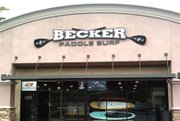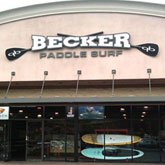Billabong Buys Core Surf Shop Becker Surf and Sport
Becker Surf and Sport, one of California’s leading independent surf retailers, was purchased for an undisclosed amount by Australian-headquartered Billabong International Ltd.
For Dave Hollander, the colorful co-founder and president of the Becker chain, the acquisition meant he was going to be an employee for the first time since June 1980, when he started the Hermosa Beach, Calif.–based retailer. He will continue as president of the retailer, which maintains a fleet of five stores, an e-commerce site and surfboard factory. However, the new arrangement will give Becker crucial support in a tough economy for independent retailers.
“I was successful because I was a dumb surfer with a vision,” Hollander said. “But I smart enough to know that I needed a bigger player.” Much of Becker’s future direction has not been discussed, Hollander said. However, Billabong could assist his company with its vast resources for marketing ventures, remodeling efforts and strengthening Becker’s e-commerce boutique (www.beckersurf.com).
Becker will remain a multi-line surfwear store. The other retail chains owned by Billabong include Quiet Flight and Beachworks, which also are devoted to selling merchandise from many surf and skate labels, not just Billabong or its Plan B, Element, Custom, Nixon, Da Kine, Xcel and Honolua Surf Co. brands.
Billabong did not respond to requests for comment. However, according to a company statement from Billabong North America President Paul Naude, the company intends to preserve Becker’s identity as a multi-line store.
The Becker nameplate will be valuable to Billabong, said Mike Duncan, president of Board Retailers Association, a North Carolina–based trade association of independent action-sports retailers. “There’s a lot of brand equity in the Becker name,” Duncan said. “Becker has a good base in the grass roots community, and many people follow them.”
Hollander said he approached Billabong’s Naude about an acquisition a couple of years ago, but talks only started in earnest six months ago. Hollander turned down acquisitions offers in the past because he was unsure how the buyers would change his company. He considered Billabong an attractive suitor because chiefs of other Billabong divisions told him the company offers a high level of support and independence. “I know where Paul is coming from. We share the same vision,” Hollander said. “I know what the store will look like the day after the sale.”—Andrew Asch























